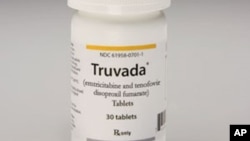Physicians who work with HIV patients are hailing a new federal recommendation that . Proponents say that could transform AIDS prevention from reliance solely on condoms to a regimen that includes the anti-retroviral drug.
The number of new HIV infections in the United States has stubbornly remained steady at 50,000 a year. Public health officials have advocated the use of condoms almost exclusively for preventing the spread of the virus. It is mostly transmitted by young, homosexual men who do not use condoms.
So doctors who treat patients infected with the AIDS virus are applauding the new federal recommendation that the antiretroviral drug Truvada be used to contain the spread of HIV and protect uninfected individuals.
Richard Elion is clinical research director at Washington, D.C.'s Whitman Walker Clinic.
"To have a biological prevention is incredibly important to people who do not have lifestyles exactly as they should. So, I think it is a valuable addition in the fight against HIV and to push us toward the day when we will have an AIDS-free generation," said Elion.
Studies have shown that Truvada is 99 percent effective in preventing HIV infection. At Whitman-Walker, doctors have prescribed the drug to about 170 patients, although they, and public health officials, continue to recommend that condoms be used in conjunction with the drug regimen. Generic versions of Truvada are made in India, and it has become the mainstay of AIDS treatment in poor countries.
Some doctors denounce the widespread use of the drug as encouraging promiscuity. But Elion says it is a small, vocal minority that is against using the antiretroviral drug for HIV prevention.
"It really bothers me when I see people who object to people being offered an additional tool, not the only tool, but an additional tool to prevent HIV," he said.
In the United States, almost half of those who take Truvada are women. The drug is recommended as pre-exposure prophylaxis, or PrEP, for those at high risk of infection, including people who have sex with bisexual partners, gay men who do not use condoms and IV drug abusers.
Currently, those who prescribe Truvada for HIV protection in the U.S. are primarily doctors working with AIDS patients, like Elion. But he hopes in time family doctors will see the value of making it available to those who are at high risk for infection with HIV.
The number of new HIV infections in the United States has stubbornly remained steady at 50,000 a year. Public health officials have advocated the use of condoms almost exclusively for preventing the spread of the virus. It is mostly transmitted by young, homosexual men who do not use condoms.
So doctors who treat patients infected with the AIDS virus are applauding the new federal recommendation that the antiretroviral drug Truvada be used to contain the spread of HIV and protect uninfected individuals.
Richard Elion is clinical research director at Washington, D.C.'s Whitman Walker Clinic.
"To have a biological prevention is incredibly important to people who do not have lifestyles exactly as they should. So, I think it is a valuable addition in the fight against HIV and to push us toward the day when we will have an AIDS-free generation," said Elion.
Studies have shown that Truvada is 99 percent effective in preventing HIV infection. At Whitman-Walker, doctors have prescribed the drug to about 170 patients, although they, and public health officials, continue to recommend that condoms be used in conjunction with the drug regimen. Generic versions of Truvada are made in India, and it has become the mainstay of AIDS treatment in poor countries.
Some doctors denounce the widespread use of the drug as encouraging promiscuity. But Elion says it is a small, vocal minority that is against using the antiretroviral drug for HIV prevention.
"It really bothers me when I see people who object to people being offered an additional tool, not the only tool, but an additional tool to prevent HIV," he said.
In the United States, almost half of those who take Truvada are women. The drug is recommended as pre-exposure prophylaxis, or PrEP, for those at high risk of infection, including people who have sex with bisexual partners, gay men who do not use condoms and IV drug abusers.
Currently, those who prescribe Truvada for HIV protection in the U.S. are primarily doctors working with AIDS patients, like Elion. But he hopes in time family doctors will see the value of making it available to those who are at high risk for infection with HIV.




